
On March 24, the First China Maritime Law 40-Person Roundtable Dialogue (hereinafter referred to as the “Roundtable Dialogue”) was grandly held at the Lingshui International Conference Hall of Dalian Maritime University. The event was initiated by Dalian Maritime University, supported by China Maritime Law Association (CMLA) and China Maritime Arbitration Commission (CMAC), and co-organized by Dalian Maritime Court, Shenzhen Court of International Arbitration (SCIA), and Dalian International Arbitration Court (Dalian Arbitration Commission). Chinese Journal of Maritime Law and Journal of Dalian Maritime University (Social Science Edition) participated as academic supporters. Centered on the theme of “Innovation and Development of China’s Maritime Law in the New Era,” the Roundtable Dialogue sought to forge consensus and pool strength for building China’s autonomous maritime law knowledge system.
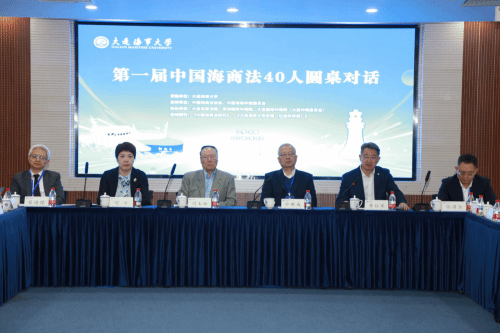
Distinguished attendees included Professor Si Yuzhuo, former President of Dalian Maritime University; Hu Fang, Deputy Chief Judge of the Fourth Civil Division of the Supreme People’s Court; Professor Yu Shicheng, former Party Secretary and President of Shanghai Maritime University; Bian Feng, Deputy Secretary of the Commission for Political and Legal Affairs of Liaoning Provincial Committee; Zhang Guoquan, Party Secretary and President of Dalian Maritime Court; Song Dihuang, Vice President of China Maritime Law Association; Liu Ying, Director of China Maritime Arbitration Commission; Huang Yaying, Council Member of Shenzhen Court of International Arbitration; Wang Zhenyi, Executive President of Dalian International Shipping Arbitration Court; Shan Hongjun, President of Dalian Maritime University; Li Zhiwen, Editor-in-Chief of Journal of Dalian Maritime University (Social Science Edition); as well as 40 representatives and over 30 distinguished guests from the Supreme People’s Court, provincial high courts of Liaoning and Hubei, 11 maritime courts nationwide, procuratorial organs, arbitration institutions, universities and research institutions, industry associations, port and shipping enterprises, insurance companies, and law firms.
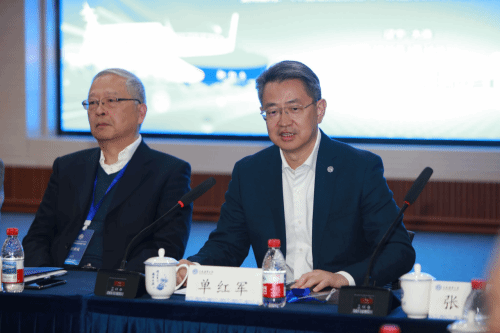
In his opening speech, President Shan Hongjun emphasized that the initiation of the “China Maritime Law 40-Person Roundtable Dialogue” by the university aims to serve the rapid advancement of China as a strong maritime, transportation, and shipping nation. By gathering top experts from legislative and judicial bodies, arbitration institutions, higher education institutions, shipping enterprises, and legal practice circles, the event seeks to establish a regular dialogue mechanism integrating “legislation, judiciary, academia, and industry”. This mechanism aims to address major theoretical and practical issues in maritime law, promoting a shift from “interpretive” to “original”, and from “follow-up research” to “groundbreaking exploration”. He stated that as the initiator of the Roundtable Dialogue, Dalian Maritime University is committed to working with all parties to further build consensus, seize opportunities, overcome challenges, and jointly advance the high-quality development of China’s maritime law sector.
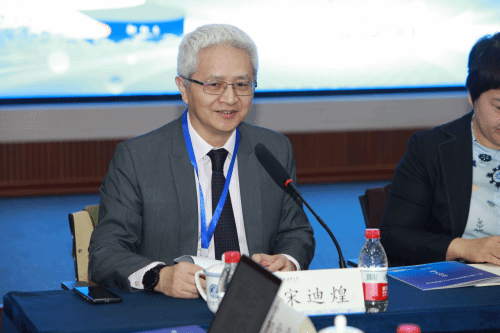
Song Dihuang, in his speech, stated that since its establishment 37 years ago, the Association has consistently promoted the specialization and internationalization of maritime law through practices such as participating in the formulation and amendment of international conventions, establishing academic platforms, and organizing thematic seminars. He called for leveraging this dialogue as an opportunity to pool wisdom from academia and industry, jointly explore the pathways for the high-quality development of maritime law, focus on enhancing China’s voice in the formulation of international maritime rules, and accelerate the construction of an autonomous knowledge system of Chinese maritime law.
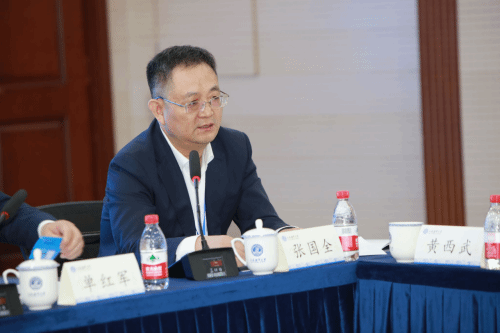
Zhang Guoquan, in his speech on behalf of the co-organizers, stated that since the implementation of the Maritime Law of the People’s Republic of China in 1993, it has achieved remarkable results in regulating maritime activities, safeguarding the rights and interests of the parties involved, and promoting the development of shipping trade. In the face of new challenges such as evolving international rules and the green and intelligent transformation of the shipping industry, there is a need to accelerate legal innovation and practical breakthroughs. He emphasized that this conference should pool the strengths of legislative, judicial, academic, and industry stakeholders to jointly promote the integrated development of the theory and practice of China’s maritime law.
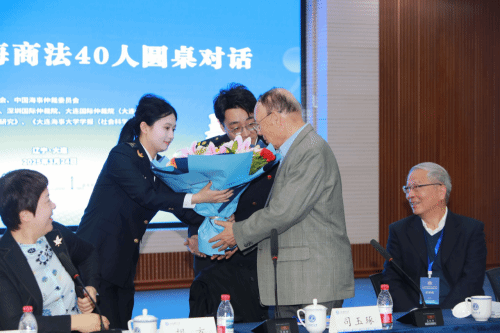
A special session titled “Tribute to Maritime Law Pioneers” was set up during the roundtable dialogue to review and pay homage to the magnificent journey of China’s maritime law predecessors who dedicated themselves to laying the foundation. Professor Si Yuzhuo, the founder of China’s maritime law education and former president of Dalian Maritime University, received flowers of respect from the younger generation at the event, symbolizing the passing on of the torch of the maritime law cause from one generation to the next.



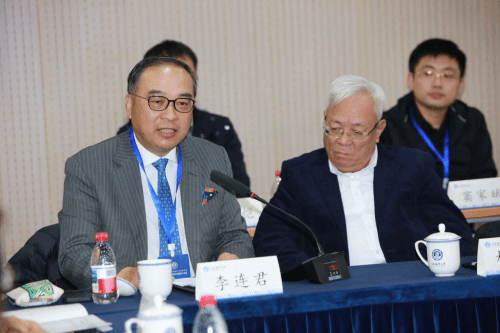
During the keynote speech session, Professor Si Yuzhuo, Professor Yu Shicheng, Deputy Chief Judge Hu Fang, and Li Lianjun, a senior partner at Reed Smith Richards Butler, systematically reviewed China’s 40-year achievements in maritime law development from multidimensional academic and practical perspectives. They explored topics including the role of maritime law studies in advancing the maritime power strategy, legislative progress of China’s shipping law and the construction of a maritime power, innovative pathways for maritime adjudication, and the enhancement of foreign-related maritime legal services. Their discussions collaboratively charted a blueprint for modernizing maritime rule of law in the new era.

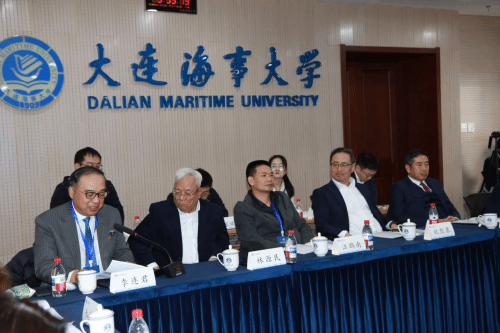
During the open discussion session, representatives and specially invited guests engaged in in-depth exchanges on topics such as the construction of an autonomous knowledge system of maritime law, the revision of the Maritime Law of the People's Republic of China and the hot issues in maritime adjudication, the reform of maritime judicial and arbitration systems, and the innovation of maritime legal services. They delved deeply into key issues including the innovation of research fields and paradigms in the study of maritime law, the construction of preferred venues for resolving maritime disputes, the empowerment of maritime law education by new technologies, and the cultivation of a new generation of maritime law talents. They put forward a number of forward-looking and practical suggestions to address these challenges.
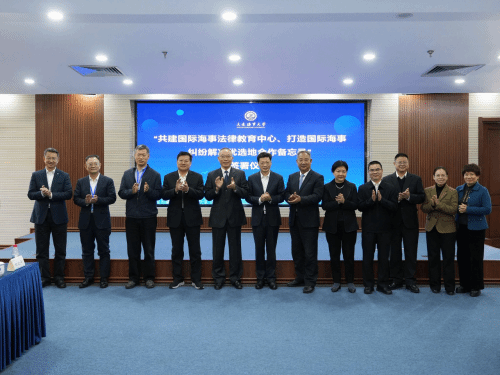
During the conference, Dalian Maritime University signed the “Cooperation Memorandum on Jointly Establishing an International Maritime Legal Education Center and Building a Preferred Venue for International Maritime Dispute Resolution” with 11 maritime courts nationwide. This landmark agreement marked the official launch of China’s first collaborative platform dedicated to international maritime dispute resolution and legal education. By leveraging the complementary strengths of the university’s academic resources and the judicial expertise of maritime courts, this partnership will explore new pathways for collaboration between maritime law teaching and research institutions and judicial authorities. It aims to provide robust support for cultivating high-caliber maritime legal professionals and establishing China as a premier hub for resolving international maritime disputes. Experts attending the conference conducted a field visit to review Dalian Maritime University’s comprehensive achievements in maritime legal ecosystem development: they visited the new library to explore global maritime legal literature, observed cutting-edge research outcomes in national maritime governance and development at the Think Tank Building, and toured “Yu Kun”, the university’s training and practice vessel, and “Xin Hong Zhuan”, a dual-purpose vessel for intelligent maritime research and training.
The successful convening of the First China Maritime Law 40-Person Roundtable Dialogue not only established a high-end platform for exchange and mutual learning to promote the high-quality development of China’s maritime law sector but also demonstrated the commitment of China’s maritime law community to support the accelerated development of a strong transportation, maritime, and shipping nation. Moving forward, this mechanism will continue to pool the wisdom and strength of academia, the judiciary, and the industry to jointly write a new chapter in the high-quality development of China’s maritime law sector, contributing legal power to China’s modernization.